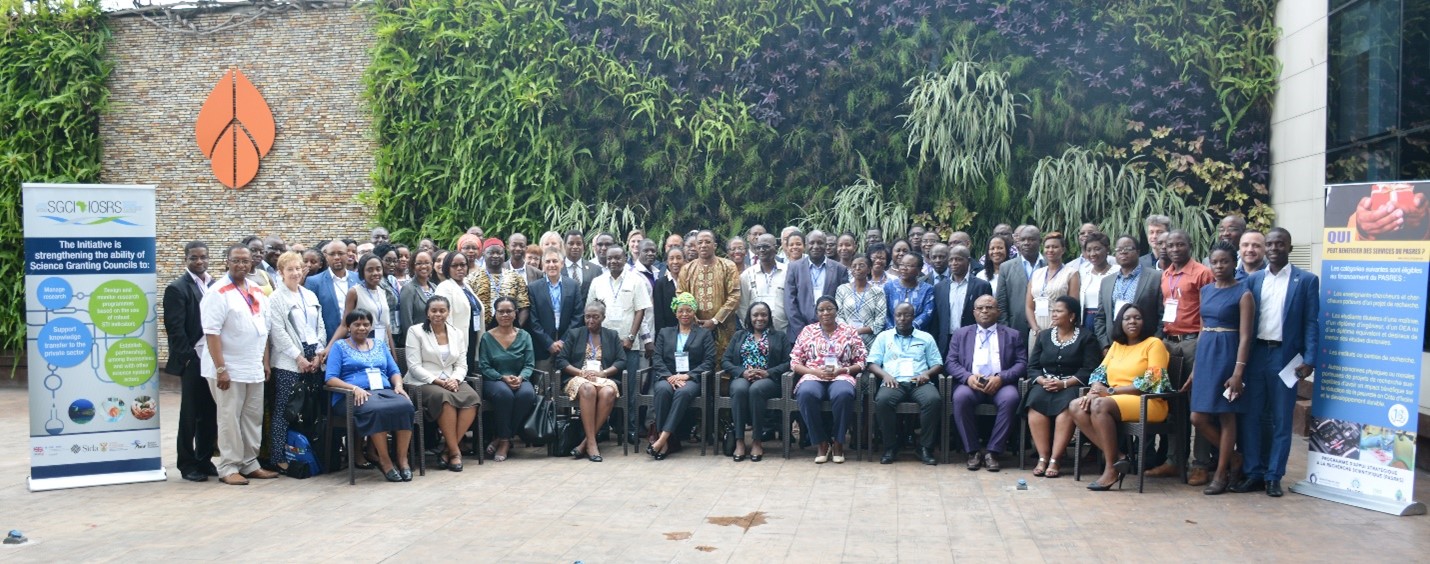Strengthening capacities of the Science Granting Councils (SGCs) in sub-Saharan Africa to support research/evidence-based policies that will contribute to economic and social development.
| UK Funders | FCDO (+UKRI for COVID-19 programming) |
| Co-Funders | IDRC, Canada; National Research Foundation (NRF) South Africa; Swedish International Development Cooperation Agency (Sida); German Research Foundation (DFG); SGC contributions |
| Funding programme | FCDO’s East Africa Research and Innovation Hub, within the Research and Evidence Division |
| Total UK investment | £5.4M (+£0.95M for COVID-19 programming) |
| Total investment | £7.3M (or £8.2M including UK COVID-19 funding) (Sida, IDRC, NRF, DGF have committed some £10.3M to SGCI-2) |
| Project dates | 1 April 2015- 30 September 2020 |
| Lead institutions | IDRC, NRF |
| Countries of focus | Botswana, Burkina Faso, Côte d’Ivoire, Ethiopia, Ghana, Kenya, Malawai, Mozambique, Namibia, Rwanda, Senegal, Tanzania, Uganda, Zambia, Zimbabwe |
| Model/approaches to RCS | Stand-alone through research, peer-to-peer exchanges, learning-by-doing, training workshops, technical support |
| Find out more | SGCI – Science Granting Councils Initiative (SGCI) in Sub-Saharan Africa (sgciafrica.org) |
Background
In 2012-14 Canada’s International Development Research Centre (IDRC) commissioned a study to better understand the role of Science Granting Councils (SGCs) in national science, technology and innovation (STI) systems in sub-Saharan Africa. This established the importance and potential contribution of a capacity strengthening programme for SGC staff and key stakeholders. In parallel, governments across Africa were making commitments to increase the contribution of STI in their economies and there was a growing recognition of national SGCs having a potentially key role in this context.
The long-term vision for SGCI is effective SGCs that will strengthen national science systems and result in nationally led research that contributes to economic and social development in sub-Saharan Africa. In the medium-term, the objective is more effective research investments and strengthened research leadership for development. This is achieved through customised training, technical support and peer-to-peer learning. Research on issues such as research excellence and master classes with regional and international peers have also stimulated discussion amongst participating SGCs.
Impacts
Enabling new collaborative funding calls
- SGCs received technical and financial support that led to nine new binational/trinational cooperation agreements, enabling several to run first-time joint calls for intra-Africa research collaboration.
- Launched the COVID-19 Africa Rapid Grant Fund– a US$5.75M multi-funder platform for COVID-19 research in Africa, led by African researchers. SGCs helped identify projects that met national priorities and will use results to inform national strategies. 74 research and science engagement projects were funded across 16 African countries, half are led by women principal investigators.
Strengthening the research environment
- Increased the international visibility of sub-Saharan Africa’s SGCs, e.g. in the Global Research Council membership group.
- Shared knowledge and experiences among the SGCs on effective strategies for engaging governments to increase spending on research, development and innovation (RDI), (e.g. helped Ghana’s Ministry of Environment, Science, Technology and Innovation establish the Ghana Innovation and Research Commercialisation (GIRC) Centre).
Development of RCS tools
- Templates, training manuals, toolkits and standard operating procedures for research calls/grants management for use by SGCs and to institutionalize capacities built under SGCI.
- Tools for collecting micro-level datasets on RDI and staff training on analysis and use in designing and managing research and RDI programmes/projects. (e.g. Zambia’s preliminary survey revealed limited participation by women in RDI and led to a specific research funding window for them).
Success factors and lessons learned
- Tailor capacity strengthening to national and institutional contexts. In addition to many commonalities, there are differences in how Councils operate and the resources available to them, to which programming needs to be sensitive.
- Create opportunities for learning by doing, peer-to-peer learning and networking.
- Conduct research (e.g. studies on the political economy of SGCsii) to inform capacity strengthening
- Collaboration between SGCs and regionally based technical support agencies helps to renew and sustain their capacities and reinforce STI systems.
- Strengthened SGCs result in a more collaborative and cohesive national and regional research ecosystem.
Future vision
Under SGCI-2, there is more emphasis on learning-by-doing through increased scope for SGCs to run research calls nationally and in collaboration with each other, as well as renewed attention to research excellence and integrating gender and inclusivity into SGC policies and procedures. There is also scope to expand SGCI activities in West Africa.
